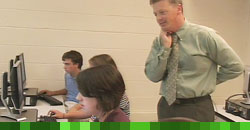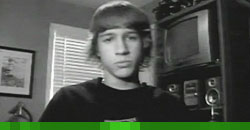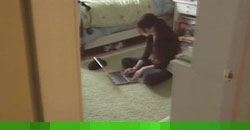


Dear FRONTLINE,
Dear Frontline,I watched Growing Up Online last night and feel you did a fairly good job of introducing many facets of the online world issue. While it became clear that many teens feel they are savvy enough to spot an obvious predator, you did not mention the patient, methodical creep who poses as another teen online, and establishes "trust" (or what amounts to such to a teenager), and lures them away via "a bunch of us are going to...". What parent can argue with "I'm going to meet so-and-so at the movies"?Again, I think Frontline did a good job of introducing the issues, but needs to do a follow-up of parenting skills for those who have hit the panic button. Skills such as:1 Establishing a culture of mutual trust in the home when children are first starting to use computers and go online, 2 Requiring phone numbers and face-to-face meetings with "friends" and parents before a child is allowed to meet them alone,3 Full disclosure of myspace/facebook (etc.) sites' content and passwords; a parent may not agree with their child's choices, but there is a vast difference between disagreement and disapproval.
Stuff like that.
Good Job, Frontline. Keep up the good work.
Jennifer Osborne
Erin, Wisconsin
FRONTLINE's editors respond:
Click here for more on the predator threat.
Dear FRONTLINE,
As with every generation, there is that need for teenagers to disconnect, and create a private world where the parents can only assume what they're doing. I appreciate the comment about most teenagers know that somebody is trying to pursue them on-line, and are smart enough to ignore them. It tells me that we are reaching our children, they do listen, and that we need to trust them a little. I'm a father of one teenager, with two more coming up behind him.
FRONTLINE kept the perspective of remaining objective, and informative. Thank you FRONTLINE, for keeping me informed without the exaggerated hype.
S Dupras
Tipp City, Ohio
Dear FRONTLINE,
What disturbed me most was the student who claims to have stopped reading books, relying on a 5 minute reading of Cliff Notes for his "understanding" of Shakespeare. And of course, this has been going on long before the rise of the Internet. THIS was the saddest moment, an "A" student who will presumably go on to a professional life, robbing himself of the true meaning of Education and Experience.
lancaster, PA
Dear FRONTLINE,
What a profound show! I am one of who knows how many adults who have met people on line. Mine was a happy ending, I ended up marrying a fabulous guy.
Because of my past experience/obsession with needing to be online, I don't allow my child to chat. Her Internet use is limited to finding information for school projects and that is monitored and yes, the computer is password protected.
Maybe I'm being a little over protective, but better safe than sorry and I can happily say that my child still interacts with us and because she doesn't know what she is missing, there is no drama over not being allowed online.
I have passed the link to this show on to friends in hopes it will educate them.
Ottawa, Canada
Dear FRONTLINE,
I think that parents should stop freaking out about their kids online.I mean,I am a 13 year old with a myspace I have had for two years.I am smart enough to know about online predators and to stop talking to cyber-bullies before I actually started believing what they said to me.That woman with the two daughters and son on last nights show made me so furious.Yeah, Your child drank with some kids, They learn lessons. Yeah, He doesn't want to give you his Password to his Facebook because he doesn't want you getting into his private life. Because you are obsessed with online predators. Your son doesn't talk to you about anything because he knows that you will go and tell the world. I think parents like that shouldn't even be so protective over their kids. All kids need to know is that, Don't talk to people you don't know(most kids use myspace and fackbook just to talk to their friends), and that if they are getting cyber-bullied to tell someone. I mean, that young boy my age who killed himself made me so upset. High school is different from 7 and 8th grade. You got to live on because you never know what could happen.
Martha Nicole
Arcata, California
Dear FRONTLINE,
Thank you for including a strong segment on how we must change our educational practices to meet the very different needs of students these days. I was particularly happy with the statement about students not being able to tolerate the classic lecture. Unfortunately, many of our schools and universities are not getting it. I see a huge disconnect between students and many faculty who still believe they must "cover the material" by standing in front of the lecture hall with two or three straight hours of blah, blah, blah. I think many of our students have found ways to learn despite our poor teaching practices -- they certainly know how to access what they need to learn in a "multitasking" way.
When I was in college in the early 1970's, I truly could not tolerate lectures -- I knew they were a complete waste of my time and energy. I need to be in an active learning environment, and I need to be able to dialogue with others. I have since been in two different degree programs online (University of Maryland, University College and University of Phoenix) and I LOVED almost every minute ... and LEARNED!
The train left the station a long time ago -- when will educators catch up?
Chrisanne Garrett
Kansas City, Kansas
Dear FRONTLINE,
As an educator, I see myself in a precarious position. I have to find a way to educate both students and parents about the negatives and positives of today's digital world. It's a tough thing, especially if parents look at me and ask me who I am giving parenting advice when I myself have no kids of my own. I do interact with these kids everyday, so I have some connection and knowledge there, but I will be the first to admit that I am not a parenting expert (if there is such a thing). But the one thing that I seem to get from this whole program is that there needs to be an open communication over the control between the parent and the student, which is the toughest thing to do, especially since it will vary from family to family. There is no "one answer" to these problems, and it will take time and work to get to a solution that satisfies all sides of the argument.
James Lamb, Jr.
Annville, PA
Dear FRONTLINE,
What overblown rubbish. The proof? The undecipherable psycho-babble the so-called "experts" were spewing. The problem with high school is the same as it's always been; it's a glorified baby sitting service, there's not much learning going on and kids have too much time on their hands, which they choose to spend unproductively chatting on social networking sites.
jarvis bailey
austin, tx
Dear FRONTLINE,
The young people today just don't get it. The way that they are exposing themselves online without conscience is extremely disturbing, to say the least. I was especially disgusted by the young man who was furious with his mother for alerting parents to their children's behavior on a train trip to Manhattan, I wanted to scream. There was even a girl who logs on to anorexic websites and that her parents didn't even know she was starving herself and that she's leading such a fake life. What about the tragic story of the young boy who committed suicide with the help of some mentally disturbed person urging him to kill himself. Something has to be done asap because these kids have been mentally incapacitated. The parents are involved, but it's obvious that more aggressive online laws and regulations need to be implemented here. I was so depressed after this program because the kids today are leading these deceptive, superficial lives. The kids featured in the program seem to have no substance (they talk a lot, but they have nothing of interest to say - empty words), they seem numb with no value system (the girl sprawling provocative photos of herself), they seem to have no creativity, it seems they are afraid to be alone with their thoughts, all of them seem to have ADD, some are very disrespectful and violent. It's a tragic situation.
Deborah Ford
Millburn, NJ
Dear FRONTLINE,
Being a teen will never be easy, whether you're growing up in the 60's, 70's, or today.
I watched the show and also felt it was feeding into middle American hysteria. The most reasonable person interviewed was Autumn Edows and my heart broke when her only creative outlet in a lonely life was deleted. I was actually happy for her and her family at the end when she got her site back up. I didn't see her as exploiting herself, she was obviously much wiser and more mature than her years.
I grew up in the 70's. We had bullies, fights, gossip, lies and threats scrawled on bathroom walls. Kids carried knives, lead pipes, guns, and whatever else. Kids also got hooked on drugs, suffered from depression, and sadly some killed themselves.
To equate the behaviors of teens with the Internet is off the mark. If the web wasn't around, this would all still be happening. The difference is that it's much more public than before and leaves a lasting digital record.
The Internet is the medium for the message. But what are the root causes fueling the messages? Being a teen will never be easy. This generation of online teens are going to grow up and have their own meltdowns with their kids. The most important thing families need to remember is that the teen years are tough and that trust and communication are key.
Nancy Marmolejo
Anaheim, CA
Dear FRONTLINE,
To every adult on here who advises worried parents to "take away the computer," please sit down and rethink your position. Like it or not, you are living in the digital age. Taking away children's computers is simply going to set them back in the world of academia. How do you expect your child to succeed in college without the necessary computer skills? Schools are increasingly incorporating technology into the program, and your child needs to be able to keep up. How do you expect you child to get a job without computer skills? Even kids working at fast food restaurants flipping burgers need to know about computers as most everything is computerized now. Take a look at the cash register the next time you order a Big Mac. It's a computer! Not that taking away a child't computer will "save" your child anyway; he or she will just use the computer somewhere else.
The computer and the Internet are not things we need to "save" our children from, but we do need to teach them how to use it properly. Parents need to act like parents and guide their children, not control their children. And children are going to be children; they will make mistakes and learn from them, just like we did. But that doesn't mean that we need to step back and let them run free with no boundaries. Set boundaries, talk with them about their online lives, share your own stories of lessons learned, just don't try and be a dictator and remove the computer completely. You'll only create more problems.
Frontline, nice piece. I found this to be a balanced report. I'm glad that you did not focus on predator-fear-mongering.
Alexandria, VA
Dear FRONTLINE,
I would like to say to the girl that has an eating disorder that I am glad that you did let your parents know about this matter and I am glad that she is getting the help and the support that she needs. Keep getting the support that you need and things will be looking better for yourself and your health. I have seen shows about people with this same problem. Hope everything goes good for her and I wish her all the luck.
Gary Baker
Easton, Pennsylvianna
Dear FRONTLINE,
Dear Frontline .... It is not often that I would write to express my opinion on a report but, this topic is so important that I feel a need to input my thoughts. As a parent of a middle schooler, I find it appalling that children believe that they should be allowed to break the law and behave in socially irresponsible ways at any time as long as an adult can not see them do it. Even after they are found out, they think it is the adult problem for looking and they do not accept responsibility for their actions. Parents should not turn away and allow the kids to do what they want because this is the way it is and we have to accept it.
I urge the parents of this country to start being responsible adults and parents. We have to send a message that wrong is wrong. Just because an adult is not watching, it does not give children the right to behave in any manner they want. If an adult finds out a kid is behaving inappropriately, it should not be the parent that feels guilty. Parents... encourage kids to talk to each other and an adult about their problems. Use the internet to help find good solutions. If you find them using the internet inappropriately, teach them how to use it correctly. If it continues, take it away. If they will not give you their PW, take the computer access away. Set the rules early and stick to them. Don't be afraid to be a parent.
Parents should also welcome and encourage other parents to discuss problems and report inappropriate behavior. Let he kids know that parents and adults are all together on this. The kids are not in charge of the parents. Kids are still learning and need help understanding what socially responsible behavior is. Of course they will try things, but the message has to be clear on what is ok and what is not ok. Also, where to get help if you need it. Perhaps the media can help support hhe parents more on this.
Thank for the great show and the opportunity to speak my mind.
Mike M. from VT
Mike M
Waterbury, VT
Dear FRONTLINE,
The faceless anonymity given to users of 'social networks' defies what we'd think of as 'responsible convention' in society. The cyberbullying, vapid (and often pornographic) chat is very superficial and self-centered, and brings out the voyeur in just about anyone who looks at it. I found the use of terrorist tactics used in facilitating the suicide of the 13-year-old to be the ultimate statement of the heartless side of the web; nobody can be seen nor held responsible; don't worry, the kids are OK. Right.
Westfield, MA
Dear FRONTLINE,
The Growing Up Online program on Frontline last night was like saying to parents, "You must teach your children to swim, but there is a huge chance they will drown." Yes, the Internet poses risks for teenagers, but that is all the more reason parents need calm, reasonable advice about how to talk to their children about the choices they make online. Programs like this make parents feel they should control what kids do online, something that is rarely an option with adolescents and, in any case, does not give them the skills they need to thrive in the online environments that will dominate their adults lives.
For the past five years, I have written a column, also called Growing Up Online. Instead of scaring parents, it gives them concise, actionable advice about how to talk to their children about what they are doing online so they can make wise choices. I believe parents can raise children who are as safe, responsible and ethical online as they are in the real world if they get information and guidance instead of the-sky-is-falling hysteria. IMHO, PBS missed an opportunity. I hope parents who would like a different point of view will read my column at www.growing-up-online.com.
Carolyn Jabs
Holland,, Ohio 43528